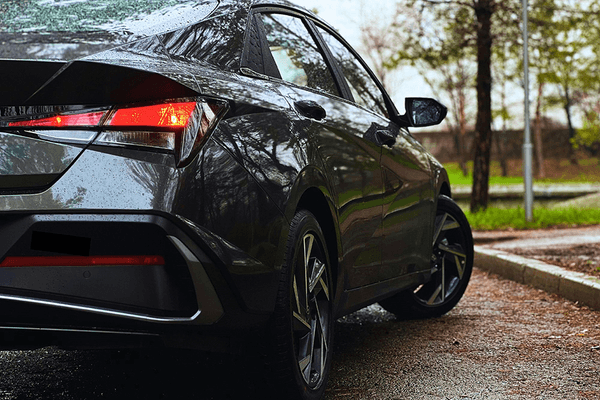
Share
Learn about car loan deposits in Australia. Discover how much deposit you need, benefits of putting money down, and no-deposit options for Victorian buyers.
Picture this scenario: you’ve found the perfect vehicle for your needs, whether it’s a reliable family SUV for weekend adventures or a fuel-efficient sedan for your daily Melbourne commute. As you explore financing options, a crucial question emerges. Do you need a deposit for your car loan, and if so, how much?
The answer isn’t as straightforward as you might expect. While deposits aren’t always mandatory for car loans in Australia, understanding how they work can significantly impact your borrowing costs and loan terms. From first-time buyers to families upgrading their vehicles, Victorian car purchasers have more financing flexibility than ever before.
Here’s what you need to know about car loan deposits, their potential benefits, and how to determine what approach might work best for your financial situation.
Do you need a deposit for a car loan?
The straightforward answer is that deposits are typically optional for car loans in Australia. Many lenders offer no-deposit car loans, meaning you can potentially borrow the full value of the vehicle. Some financing arrangements may even allow you to borrow more than the purchase price to cover additional costs like registration, insurance, or accessories.
However, while 100% or higher financing is available, many buyers still choose to provide a deposit. This decision can be one of the most effective ways to potentially reduce your overall loan costs and may strengthen your approval prospects.
How no-deposit car loans work
No-deposit financing allows you to borrow the entire purchase price of your chosen vehicle. This arrangement can be particularly beneficial when:
- You need immediate access to transport for work or family commitments
- You prefer to preserve your cash reserves for other financial priorities
- You’re confident in managing slightly higher monthly repayments
- Market conditions favour keeping your money invested elsewhere
When deposits might be required
While deposits aren’t universally mandated, certain circumstances may influence whether a lender requests one:
- Credit profile considerations: If your credit history presents some challenges, a deposit may demonstrate your commitment and financial stability to potential lenders
- Lender-specific policies: Different financial institutions have varying criteria and risk assessment processes
- Loan amount and vehicle type: Higher-value loans or specific vehicle categories may influence deposit requirements
- Individual financial circumstances: Your income, expenses, and overall financial position may impact whether a deposit would benefit your application
Professional assessment importance
Given the complexity of individual financial situations, the best place to start when looking for a car and a car loan is to speak to a finance broker. They can assess your specific circumstances and explain what options may be available to you.
How car loan deposits work
Car loan deposit requirements are typically based on what’s called the loan-to-value ratio (LVR). This represents the percentage of the vehicle’s purchase price that the lender is prepared to finance. If a lender offers an LVR of 90%, this means you would need to contribute the remaining 10% as a deposit.
Understanding loan-to-value ratio calculations
The LVR calculation is straightforward: it’s the loan amount divided by the vehicle’s value, expressed as a percentage. For example, if you’re purchasing a $40,000 vehicle and can borrow $36,000, your LVR would be 90%, requiring a 10% deposit of $4,000.
Typical LVR percentages available
Australian lenders commonly offer various LVR options:
- 100% LVR: Full financing with no deposit required
- 90% LVR: 10% deposit needed
- 80% LVR: 20% deposit required
- 110% LVR: Financing above purchase price to cover additional costs
How deposits reduce your borrowing amount
When you provide a deposit, you’re directly reducing the principal amount you need to borrow. This reduction can have several flow-on effects throughout the life of your loan, potentially affecting your repayment amounts, total interest costs, and loan terms.
Real-world example: Consider a typical Victorian car purchase scenario:
- Vehicle: $30,000 used SUV
- No deposit: Borrow full $30,000 over 5 years
- 10% deposit ($3,000): Borrow $27,000 over 5 years
- 20% deposit ($6,000): Borrow $24,000 over 5 years
While exact savings depend on interest rates and loan terms, the 20% deposit option typically results in lower monthly repayments and reduced total interest costs compared to no-deposit financing.
Cost impact illustration: Based on typical market conditions, a $3,000 deposit on a $30,000 vehicle purchase could potentially save hundreds of dollars in interest over a 5-year loan term, while also reducing monthly repayments by approximately $50-70.
The potential benefits of putting down a car loan deposit
Contributing a deposit toward your vehicle purchase can offer several advantages that may align with your financial goals and circumstances.
Financial cost benefits
Reduced total borrowing costs
By providing a deposit, you directly reduce the principal amount requiring finance. This reduction may lead to meaningful interest savings over your loan term, with the actual benefit depending on factors including interest rate, loan duration, and deposit size.
Lower monthly repayment amounts
Smaller loan amounts typically translate to reduced periodic repayments, potentially improving your monthly cash flow management. For many Victorian families, this reduction can make the difference between stretching the budget and comfortable affordability.
Approval and terms advantages
Strengthened application prospects
Lenders may view deposits favourably as they demonstrate:
- Financial discipline and saving ability
- Commitment to the purchase
- Reduced lending risk exposure
- Enhanced borrower reliability
Access to competitive interest rates
Some lenders offer more attractive rates to borrowers providing deposits, recognising the reduced risk profile. However, rates depend on multiple factors, making careful comparison important.
Expanded product options
Having a deposit may unlock access to:
- Premium loan products with enhanced features
- More flexible repayment terms
- Additional borrowing options for vehicle-related costs
Ownership and equity benefits
Faster path to full ownership
With reduced borrowing amounts, you may choose shorter loan terms, potentially allowing quicker vehicle ownership while minimising total interest costs.
Immediate equity position
Your deposit creates instant equity in the vehicle, providing a financial buffer against depreciation and offering greater flexibility for future vehicle changes.
How much deposit should you evaluate?
Determining an appropriate deposit amount requires balancing potential benefits against your overall financial wellness. There’s no universal “correct” amount, but understanding common approaches can guide your decision-making.
Common deposit benchmarks
The 10% baseline approach
Many financial advisors suggest 10% as a starting point for car loan deposits. This amount often provides meaningful benefits while remaining achievable for most budgets.
Example scenarios:
- $25,000 vehicle: $2,500 deposit
- $35,000 vehicle: $3,500 deposit
- $45,000 vehicle: $4,500 deposit
The 20% optimal strategy
A 20% deposit typically maximises potential cost savings and loan term improvements, though it requires more substantial upfront capital.
Potential advantages of 20% deposits:
- Significant monthly repayment reductions
- Enhanced access to competitive rates
- Stronger negotiating position with lenders
- Greater protection against vehicle depreciation
Alternative deposit approaches
Some buyers choose different strategies based on their circumstances:
- 5% deposits: Minimal upfront cost while still demonstrating commitment
- 25%+ deposits: Maximum cost reduction for cash-rich buyers
- Flexible amounts: Tailored to specific financial situations and goals
Personal situation assessment factors
Financial capacity evaluation
- Available savings: How much can you contribute without compromising emergency funds?
- Cash flow impact: Will the deposit affect your ability to manage ongoing expenses?
- Income stability: Does your employment situation support the chosen approach?
Vehicle and loan considerations
- New vs used vehicles: Depreciation patterns may influence optimal deposit strategies
- Loan term preferences: Shorter terms may work better with larger deposits
- Total borrowing needs: Consider registration, insurance, and accessory costs
Risk tolerance factors
- Credit profile strength: Those with excellent credit may have more flexibility
- Market timing: Current interest rate environment and personal circumstances
- Future financial plans: How does this purchase fit your broader financial goals?
When to evaluate no-deposit options
There are legitimate scenarios where arranging finance without a deposit may better suit your circumstances.
Timing considerations
If you need vehicular transport urgently—perhaps due to work requirements or family circumstances—waiting to accumulate a substantial deposit might not be practical. No-deposit financing can provide immediate access to the vehicle you need.
Financial planning factors
Preserving your available cash for other purposes might sometimes be more beneficial than using it for a car deposit. Consider whether your money might be better allocated to:
- Maintaining an adequate emergency fund
- Paying down higher-interest debt
- Investment opportunities
- Other immediate financial priorities
Cash flow considerations
Some buyers prefer to maintain their cash reserves and manage the slightly higher repayments that may come with no-deposit financing. This approach can provide financial flexibility for unexpected expenses or opportunities.
Professional guidance for Victorian car buyers
Making informed decisions about car loan deposits requires careful evaluation of your individual circumstances and available options.
Assessing your financial readiness
Before making deposit decisions, conduct a thorough review of your financial position, including your income, expenses, existing debts, and financial goals. This assessment should also include consideration of ongoing vehicle costs such as registration, insurance, maintenance, and fuel.
Working with licensed finance brokers
The complexity of loan products and lending criteria means that professional guidance can be particularly valuable. Licensed finance brokers can:
- Assess your specific financial situation
- Explain various deposit options and their implications
- Compare loan products from multiple lenders
- Help structure arrangements that align with your needs
- Navigate the application process
Comparing loan options appropriately
When evaluating different financing arrangements, look beyond just interest rates. Consider factors such as:
- Total cost over the loan term
- Flexibility of repayment options
- Fees and charges
- Early repayment conditions
- Customer service and support
Making the right choice for your situation
Car loan deposits represent one important element of your broader vehicle financing strategy. While they can offer substantial benefits including reduced costs and improved loan terms, the optimal choice depends entirely on your individual financial circumstances, goals, and priorities.
Your next steps
To make an informed decision about car loan deposits:
- Assess your financial position thoroughly, including available savings, monthly cash flow, and emergency fund requirements
- Calculate potential scenarios comparing different deposit amounts and their impact on your loan terms
- Evaluate your timeline and whether immediate vehicle access outweighs waiting to save a larger deposit
- Research available options from multiple lenders to understand how deposits affect rates and terms
- Seek professional guidance from licensed finance brokers who can provide personalised advice
The value of professional consultation
Given the complexity of lending products and individual financial situations, professional guidance proves invaluable for most car buyers. Licensed finance brokers can assess your specific circumstances, explain various deposit strategies, and help structure arrangements that support your broader financial objectives.
Remember that your complete financial situation will need to be assessed before acceptance of any proposal or product. Taking time to evaluate your options thoroughly, with appropriate professional support, ensures your vehicle financing decision strengthens rather than strains your financial position.
Whether you choose a substantial deposit, modest contribution, or no-deposit financing, being well-informed empowers you to make decisions that align with both your immediate transport needs and long-term financial wellbeing.
The best place to start when looking for a car and a car loan is to speak to a finance broker who can assess your individual situation and explain what options may be available to you.
Further questions
Can I get a car loan with no deposit in Australia?
How much deposit should I save for a car loan?
What are the benefits of putting down a deposit on a car loan?
Should I use my emergency fund for a car loan deposit?
How does a car loan deposit affect my interest rate?
This is general information only and is subject to change at any given time. Your complete financial situation will need to be assessed before acceptance of any proposal or product.





